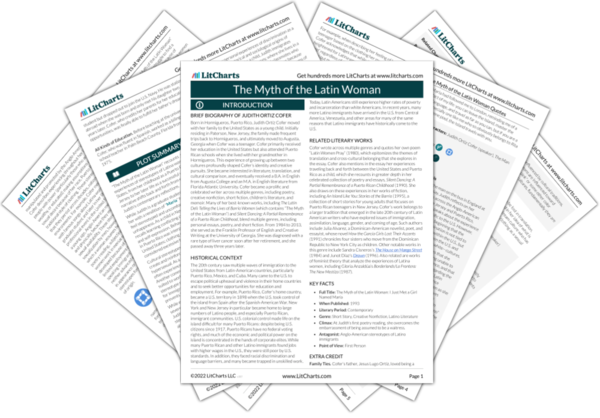“The Myth of the Latin Woman” emphasizes the central importance of education, particularly in arts and culture, in advancing the status of Latina women in Anglo-American society. Cofer argues that education gives Latina women crucial tools to transform pervasive narratives about themselves and thus opens up new possibilities for upward mobility. Cofer describes some of the particular challenges faced by Latin American immigrants who come to the United States with limited English, little money, and few professional skills. These circumstances trap immigrants, particularly women, in menial and low-paid jobs, such as domestic service, waitressing, and factory labor. Because Cofer’s parents were able to provide her with an education, her resulting professional success protects her from the more severe and restrictive discrimination that many Latina women experience because they have fewer opportunities to advance. These women, in contrast, more directly spend their lives struggling against the “myth of the Latina as whore, domestic, or criminal.” In Cofer’s case, though, she has not only harnessed the power of a good education; she has also used her position as an artist and writer to promote alternative and empowering narratives about Latina women. Through her work, then, she is able to introduce mainstream American audiences to the nuanced “realities” of life as a Latina woman, thus defying the myths and stereotypes that perpetuate the marginalization of Latina women.
Immigration, Education, and Upward Mobility ThemeTracker

Immigration, Education, and Upward Mobility Quotes in The Myth of the Latin Woman
Since I do not wear my diplomas around my neck for all to see, I too have on occasion been sent to that “kitchen,” where some think I obviously belong.
Every time I give a reading, I hope the stories I tell, the dreams and fears I examine in my work, can achieve some universal truth which will get my audience past the particulars of my skin color, my accent, or my clothes.
[This poem] is a prayer for communication, and for respect. In it, Latin women pray “in Spanish to an Anglo God / with a Jewish heritage,” and they are “fervently hoping / that if not omnipotent, / at least He be bilingual.”











